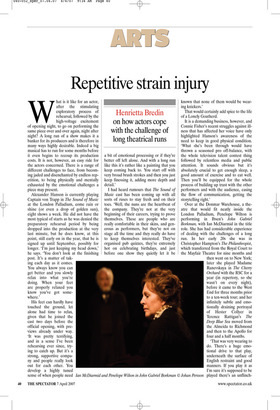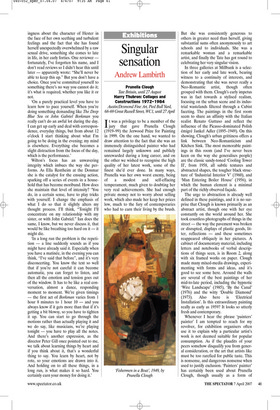Repetitive strain injury
Henrietta Bredin on how actors cope with the challenge of long theatrical runs
What is it like for an actor, after the stimulating exploratory process of rehearsal, followed by the high-voltage excitement of opening night, to go on performing the same piece over and over again, night after night? A long run of a show makes it a banker for its producers and is therefore in many ways highly desirable. Indeed a big musical has to run for some months before it even begins to recoup its production costs. It is not, however, an easy ride for the actors concerned. There is a range of different challenges to face, from becoming jaded and disenchanted by endless repetition, to being physically and mentally exhausted by the emotional challenges a piece may present.
Alexander Hanson is currently playing Captain von Trapp in The Sound of Music at the London Palladium, come rain or shine (or even a drop of golden sun), eight shows a week. He did not have the most typical of starts as he was denied the preparatory rehearsal period by being dropped into the production at the very last minute, but he does know, at this point, still early on in the year, that he is signed up until September, possibly for longer. ‘I’m just keeping my head down,’ he says. ‘You don’t look at the finishing post. It’s a matter of taking each day as it comes. You always know you can get better and you slowly relax into what you’re doing. When your feet are properly relaxed you know you’ve got somewhere.’ His feet can hardly have touched the ground, let alone had time to relax, given that he joined the cast two days before the official opening, with previews already under way. ‘It was pretty terrifying, and in a sense I’ve been rehearsing ever since, trying to catch up. But it’s a strong, supportive company and people really look out for each other. You develop a highly tuned sense of when people need a bit of emotional processing or if they’re better off left alone. And with a long run like this it’s rather like a painting that you keep coming back to. You start off with very broad brush strokes and then you just keep finessing it, adding more depth and detail.’ I had heard rumours that The Sound of Music cast has been coming up with all sorts of ruses to stay fresh and on their toes. ‘Well, the nuns are the heartbeat of the company. They’re not at the very beginning of their careers, trying to prove themselves. These are people who are really comfortable in their skins, and generous as performers, but they’re not on stage all the time and they really do have to keep themselves interested. They’ve organised pub quizzes, they’re extremely hot on celebrating birthdays, and just before one show they quietly let it be known that none of them would be wearing knickers.’ That would certainly add spice to the life of a Lonely Goatherd.
It is a demanding business, however, and Connie Fisher’s recent struggles against illness that has affected her voice have only highlighted Hanson’s awareness of the need to keep in good physical condition. ‘What she’s been through would have thrown a seasoned pro off-balance, with the whole television talent contest thing followed by relentless media and public attention. It sounds obvious but it’s absolutely crucial to get enough sleep, a good amount of exercise and to eat well. Then you’ll be equipped for the whole process of building up trust with the other performers and with the audience, easing the flow of communication, getting the storytelling right.’ Over at the Donmar Warehouse, a theatre that would fit neatly inside the London Palladium, Penelope Wilton is performing in Ibsen’s John Gabriel Borkman, with Ian McDiarmid in the title role. She has had considerable experience of dealing with the challenges of a long run. In her early 20s she was in Christopher Hampton’s The Philanthropist, which transferred from the Royal Court to the Mayfair Theatre for nine months and then went on to New York; later she played Madame Ranevskaya in The Cherry Orchard with the RSC for a year (in repertory, so she wasn’t on every night), before it came to the West End for three months prior to a ten-week tour; and her infinitely subtle and emotionally draining portrayal of Hester Collyer in Terence Rattigan’s The Deep Blue Sea moved from the Almeida to Richmond and then to the Apollo for four and a half months.
‘That was very wearing to do. There’s a huge emotional drive to that play, underneath the surface of English restraint and good manners. If you play it as I’m sure it’s supposed to be played there’s an unflinch ingness about the character of Hester in the face of her own seething and turbulent feelings and the fact that she has found herself unexpectedly overwhelmed by a raw sexual drive, something she comes to late in life, in her early forties. One reviewer fortunately, I’ve forgotten his name, and I don’t read reviews so I didn’t hear this until later — apparently wrote: “She’ll never be able to keep this up.” But you don’t have a choice. Once you’ve committed yourself to something there’s no way you cannot do it; it’s what is required, whether you like it or not.
‘On a purely practical level you have to learn how to pace yourself. When you’re doing something demanding like The Deep Blue Sea or John Gabriel Borkman you really can’t do an awful lot during the day. I can get up early and deal with correspondence, everyday things, but from about 12 o’clock I start thinking about what I’m going to be doing in the evening; my mind is elsewhere. Everything else becomes a slight distraction from the focus of the day, which is the performance.’ Wilton’s focus has an unwavering integrity which imbues the way she performs. As Ella Rentheim at the Donmar she is the catalyst for the ensuing action, sparking off a series of events in a household that has become moribund. How does she maintain that level of intensity? ‘You do, in a certain sense, have to play tricks with yourself. I change the emphasis of what I do so that it slightly alters my thought process. I’ll think, “Tonight I’ll concentrate on my relationship with my sister, or with John Gabriel.” Ian does the same, I know, but we never discuss it, that would be like breathing too hard on it — it might die.
‘In a long run the problem is the repetition — a line suddenly sounds as if you might have already said it. Especially when you have a matinée, in the evening you can think, “I’ve said that before”, and it’s very disconcerting. You know the text so well that if you’re not careful it can become automatic, you can forget to listen, and then all the emotion and tension goes out of the window. It has to be like a real conversation, almost a dance, responding moment to moment. We’re given timings — the first act of Borkman varies from 1 hour 8 minutes to 1 hour 10 — and you always know if it gets more than that if it’s getting a bit blowsy, so you have to tighten it up. You can start to go through the motions rather than actually playing it and we do say, like musicians, we’re playing tonight — you have to play all the notes. And there’s another expression, as the director Peter Gill once pointed out to me, we talk about learning things by heart and if you think about it, that’s a wonderful thing to say. You learn by heart, not by rote, so your emotions are drawn into it. And holding on to all these things, in a long run, is what makes it so hard. You certainly earn your money for doing it.’



































































 Previous page
Previous page